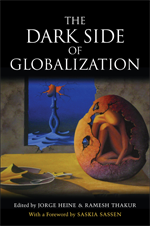Civil society and decolonisation in South America Book chapter in "The Dark Side of Globalization"
Temas
An historical overview of Latin American debates and experiences related to democracy, citizenship and civil society and some highlights of current conflicts in Venezuela, Ecuador and Bolivia.

Autores
In this chapter I attempt both to characterize some broad historical problems in reference to Latin American debates and experiences related to democracy, citizenship and civil society, as well as present highlights of current conflicts related to these issues, with examples from Venezuela, Ecuador and Bolivia.
Latin American critical debates about democracy, civil society and citizenship have historically occurred mainly in two, at times separate and at times more interrelated, dimensions or levels. One level can be seen as contained within the limits of “modern” western democracy, confrontations and debates that can be described in general terms as struggles within the political spectrum from left to right. It is the realm of the struggle for inclusion, for equality, for citizenship, for individual rights. This has traditionally been the domain within which political parties have been involved.
Within this overall framework, the most radical perspectives lead to the rejection of liberal democracy characterized as a capitalist democracy that serves to reproduce and legitimize class domination.
The other level can be best described as civilizational confrontations, or cultural wars, that is, the historical struggle between the modern/colonial modes of life, and the multiple expressions of both resistance and the practical construction and reconstruction of other cultural alternatives.
This is the realm of the struggle for the decolonization of societies which have become particularly salient in recent years. Here the colonial and Eurocentric nature of the liberal nation-state in the continent is the central issue.
The relations between these two dimensions have been complex, intertwined in different uneasy combinations in diverse times and places in Latin American history. I would argue that it is not possible to understand Latin American political history, or the multiple meanings of democracy, civil society and citizenship, if any one of these two dimensions is ignored. I will deal with some of the issues at both spheres.
The PDF is a chapter from The Dark Side of Globilization. The book in its entirety is available at United Nations University
Pages: 22
